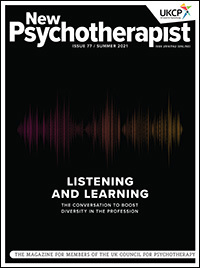
De-stigmatising therapy in Indian communities
 The summer issue of the New Psychotherapist looks at diversity and how a more diverse profession will help to increase access to psychotherapy for minority communities. We received a tremendous response to our call for members to give a snapshot of their practice and discuss what inclusion means to them and not all could be included in the magazine.
The summer issue of the New Psychotherapist looks at diversity and how a more diverse profession will help to increase access to psychotherapy for minority communities. We received a tremendous response to our call for members to give a snapshot of their practice and discuss what inclusion means to them and not all could be included in the magazine.
Here, integrative psychotherapist Daljinder Bal explains why she believes therapy needs to be more affordable and de-stigmatised.
I’m four years into my post-accreditation and I would say majority of my private clients have come from a Caucasian background. It is largely when I have worked in charitable or low-cost counselling services, in more diverse areas, that I have worked with more diverse clients. Like all clients, they too brought their anxieties, depression, relationship and family difficulties, trauma, self-harm, suicidal ideation, eating disorders, body image issues, OCD, identity issues and bereavement and loss.
There could be a number of factors which impact the diversity of my clients. It could be where my private practice is based. The cost of psychotherapy can be prohibitive to some, and based on my own cultural upbringing and professional experience, it’s possible that some individuals come from a culture where it is not seen to be the ‘done’ thing – to open up to anybody, let alone a stranger who you pay to speak to.
Some of my clients from Indian backgrounds may have sought me out more than non-Indian practitioners because of our perceived similar, and maybe even shared, cultures. From just reading my name and looking at my picture on a directory site some clients can quickly distinguish my cultural roots and therefore decide to contact me based on that. I may be deemed to be more relatable.
Often, these clients have entered counselling as a last resort not really knowing what counselling is with the need to feel understood by someone who may understand their circumstances. Therapy is not there to fix, however I believe it can be a place to challenge clients, to help them understand themselves as well as their relationships with others, to empower them, to help them breakaway from unhelpful ways of being, to provide them with supportive psycho-educational knowledge if needed, to find tools that they can carry forwards with them in to the outside world.
I hope that my work with clients not only helps them to understand and unravel the issue/s they may be presenting with but also to provide them with more awareness to elicit change. Therapy can not only have an impact on the person that sits before me in sessions but it may also have a ripple effect on the rest of the society that surrounds them.
If they feel more grounded and healed, they may enter society with a different perspective and outlook. Their interactions in society may now be coming from less of the hurt inner child and more from the healed part of themselves. Through therapy, they may choose to play a different role, not only one which may be more helpful and safer for them but may invite others around them to have a healthier and more functional relationship with them also.
This is why counselling and psychotherapy needs to become more affordable for everyone and de-stigmatised even further in some cultures. The notion that counselling is a luxury expense or that it is something that only the really mentally unwell enter needs to be challenged further.
Share
Like most websites, we use cookies. If this is okay with you, please close this message or read more about your options.


